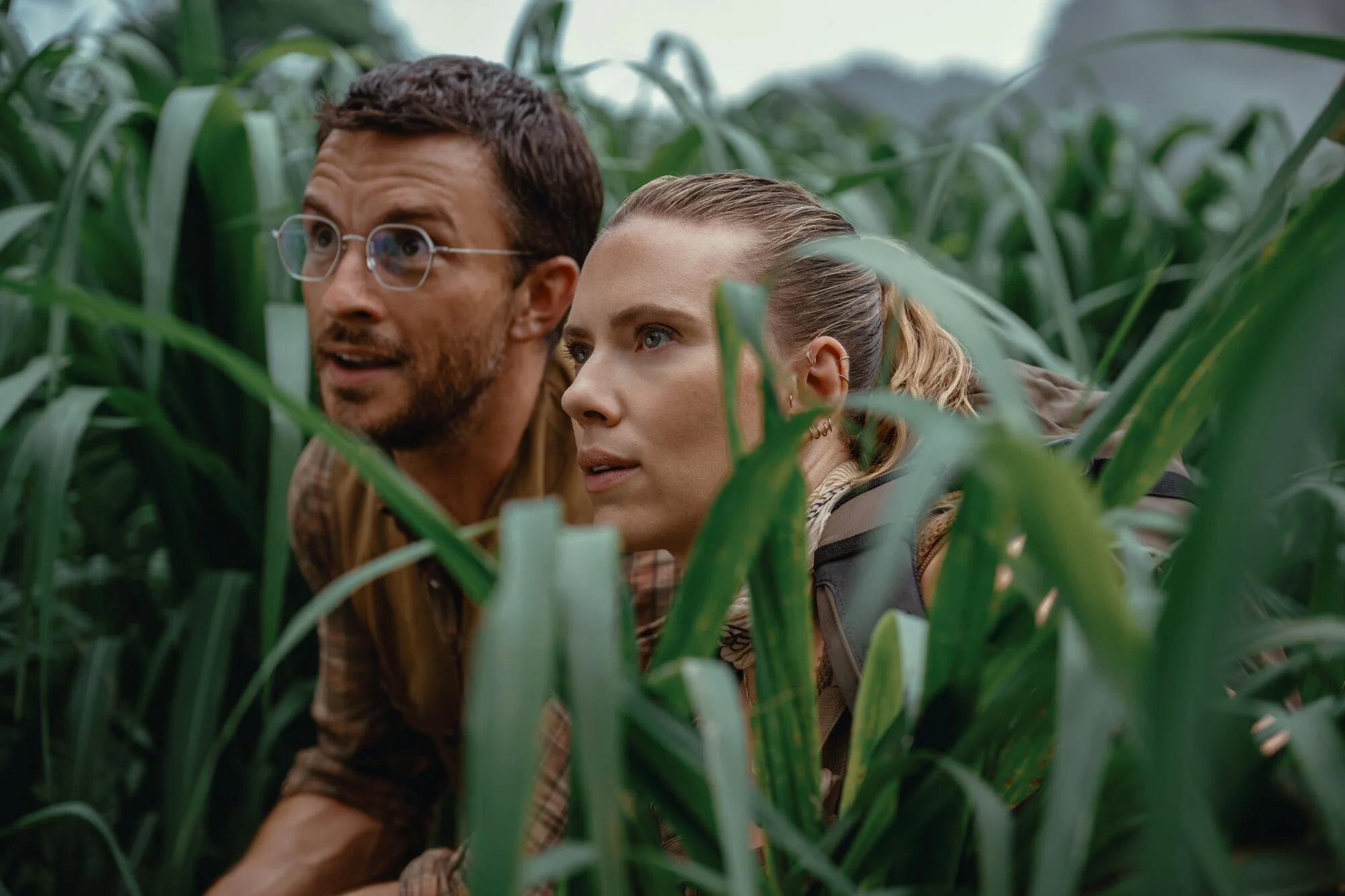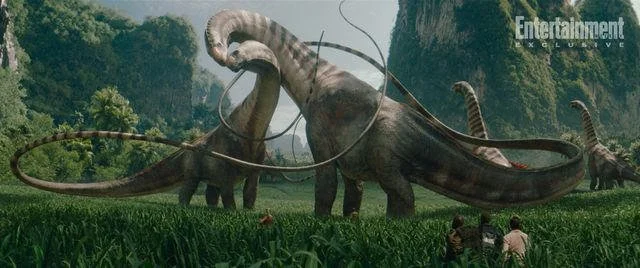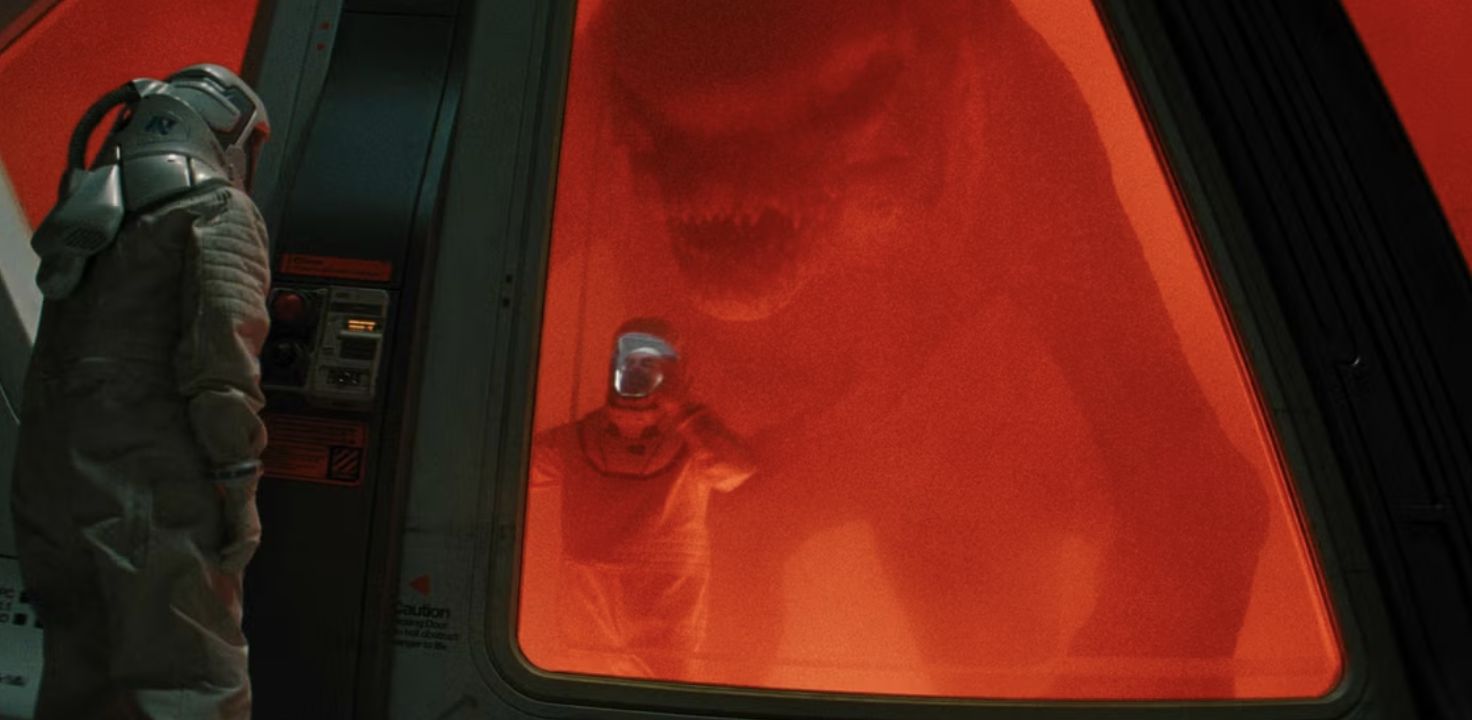'Jurassic World Rebirth' Review: More Than Dinosaurs, More Than Fiction
By Carolina Dionísio
Image Courtesy of Universal Entertainment, Amblin Entertainment, and the Los Angeles Times
Last Saturday, I was fortunate to watch the new Jurassic World movie at the theatre. Directed by Gareth Edwards and written by David Koepp, it’s a little over two hours long and the seventh installment overall in the Jurassic Park franchise, and also a standalone sequel to Jurassic World Dominion (2022).
I confess I went for the nostalgia involved (I’ve always loved these movies, both World and Park), not because I was super hyped and had high expectations. Well, was I wrong!
We started by entering the second-to-last session of the night, and it was a full room. Right off the bat, I was surprised by how many people were already there, and then the movie started, and it was blow after blow.
The opening sequence is quick, bloody, and triggered by a man littering in a very dangerous place to litter at — great start. 7 years later, we’re transported to New York and given the knowledge that dinosaurs have been around for a while, but people just don’t find them interesting anymore; therefore, proper funding for dinosaur protection has rapidly decreased, and even having basic empathy towards the poor animals is a sacrifice.
I feel like this is a very spot-on representation of the reality of social media today: we have a new trend blowing every other month, but when the clock hits midnight and whatever hot topic isn't exactly new anymore, people just forget and move on to the next big hit.
We’re then introduced to Martin Krebs (Rupert Friend), an executive at pharmaceutical company ParkerGenix who recruits Zora Bennett (Scarlett Johansson), a former ex-military covert operative, to go on a dangerous mission in exchange for millions of dollars. The goal is to retrieve biomaterial samples from the three largest remaining prehistoric specimens: Mosasaurus, Titanosaurus, and Quetzalcoatlus. Those samples are key to a new heart disease treatment, and Krebs mentions Zora’s mother’s death as a way to persuade her into taking the job.
Because the catch is: the Earth's climate has become inhospitable to sustain the de-extinct dinosaurs, so they are forced to reside in areas around the equator, which resemble the Mesozoic climate—and those regions are completely forbidden due to an “accident” that Krebs keeps a secret.
Zora accepts, and they decide to collaborate with paleontologist Dr. Henry Loomis (Jonathan Bailey). He’s a civilian who works at a dinosaur museum and is clearly financially and psychologically shaken, because no one seems to have interest and want to visit anymore. He says people used to queue for hours to be able to get in the museum, but now, he can barely sell a couple tickets.
So, he accepts the job, and they all travel to the island of Ile Saint-Hubert. Zora also recruits her longtime friend Duncan Kincaid (Mahershala Ali) to lead the expedition, who brings the boat driver LeClerc (Béchir Sylvain), the mercenary Nina (Philippine Velge), and the security chief Bobby Atwater (Ed Skrein).
In the meantime, we’re also introduced to Ruben Delgado (Manuel Garcia-Rulfo) and his two daughters: Teresa (Luna Blaise), the oldest, and Isabella (Audrina Miranda) the youngest who goes non-verbal in times of great distress. We also get to know Xavier (Davd Iacono), Teresa’s boyfriend, and he ends up being a bit of the comic relief even though that doesn’t erase his clear character development.
This family is on a boat trip when they’re attacked by a dinosaur, only to end up being rescued by Zora and her team and then thrown into this mission and all its dangers. Though they do end up splitting from Zora and go on their own adventure in the Island, which will put their connections and bravery to the test.
The movie is packed with action, twists, and crazy maneuvers. Yet, during the moments of conversation between characters, the director was still slick enough to slide in some very important topics in a very natural way.
With Dr. Henry, we’re able to explore both fawn and flora through a very empathetic and concerned eye.
Dr. Henry was always very respectful of the dinosaurs, treating them as living beings instead of props for entertainment in the big city. He refused to kill or harm a dinosaur during the sample extraction process, or even when they were attacked and in extreme danger. He was also always careful on the island because he did not want to destroy or alter a home that did not belong to him — something the great leaders of today can’t relate to.
Dr. Henry even mentions to Krebs that neither the island or the Earth belong to them, and that we’re the ones that should be concerned about the climate crisis and environmental change because it is not the Earth that will end — it is us, humans.
Image Courtesy of Universal Pictures and Amblin Entertainment
Across all time and space, our planet has gone through many phases of mass extinction (The Great Dying, The Ice Age, the meteor), yet the Earth is still standing: we, however, won’t survive one of those events. That should be an eye-opener for us to stop treating the Earth like some sort of political property outlined by imaginary borders and fueled by dreams of eternal economic growth.
On the other hand, through Krebs, we get a glimpse of exactly this: capitalism and its need to please the rich under the guise of a miraculous cure for the poor.
Krebs always advertised the mission and its goals as a “life-changing” discovery that could “save millions of lives”, including Zora’s mother. Yet, when confronted with the true destiny of those samples, he’d actually sell them to a company for billions; said company would then sell the treatment for double or triple the price of production. Basically: “saving millions of lives” actually meant “saving millions of millionaires”.
It all ended well because Zora decided to put the money she’d receive from the job aside and follow Dr. Henry’s advice: give the samples to everyone, produce affordable medication to everyone, save everyone.
Unfortunately, this is not the reality of today.
Health Care is still seen as a business and not a basic human right, which often leaves patients in extreme debt for years or even unable to access medical help at all despite its urgency.
One of the millions of examples is the cost of insulin, a vital medicine that could either save or end someone's life.
In the US, the cost of insulin has significantly increased over the past few decades, with some estimates showing a 184% increase from 2012 onwards. In 2018, the average price in the US across all types of insulin was $98.70. In other countries, such as Japan or Canada, it didn’t surpass $20. In the UK and France, it didn’t reach $10. Nowadays, the average price of insulin in the US is still around $100 — this is more than ten times higher than the average for all of the other countries combined, and a completely impossible way of living for the average American citizen.
Also, through Krebs, we explore human cruelty and complete disdain towards animal life.
The “accident” he kept a secret was the events in the opening sequence, which were also triggered by the severe misconduct of scientists and researchers at the island. There, they performed the most absurd experiments on dinosaurs, which caused many of them to be deformed, extremely unhealthy, or in constant pain, so they were either killed right away (I presume), frozen and preserved in tanks, or sent to the wilderness to fend for themselves. It’s important to mention that despite all these experiments and procedures being strictly forbidden, they were always motivated by the public’s need for more.
The world was “tired” of seeing the same dinosaurs over and over again; therefore, their decreasing interest, so the lab started to try and make “new” dinosaurs to please the masses, regardless of the pain or agony it would bring the animals. But when the “new” dinosaurs turned out to be “too ugly to be looked at” (direct quote) or just straight up abominations (like the six-limbed deformed D-Rex we see in the end), they were quickly discarded.
Image Courtesy of Universal Pictures, Amblin Entertainment, and Screen Rant
It made me so sad and so angry, especially because testing on animals for the sake of human vanity and aesthetics is still a very real thing in the 2020s, with only 15% of the world’s 100 most well-known beauty brands being cruelty-free.
These are some of the topics covered in the movie. I loved how these moments always felt like a true conversation between people who cared, instead of calculated dialogue made purposely to feed the “woke” culture. I also liked how Dr. Henry wasn’t scared to speak his mind and was straight to the point instead of sugar-coating everything to make it easier to digest. We must be assertive because some things just aren’t up for debate.
I might be reaching with some of these takes. I might even hear that “it’s not that deep”, as saying that to every single thing seems to be the trend nowadays. But honestly, in the light of today’s overwhelming cyclical crisis, we can’t afford not to go “that deep”. We can’t afford to turn yet another blind eye to a very clear social critique.
We must think critically, and we must have critical opinions in critical times. So even if it’s “not that deep”, we should make it that deep.
Given not just the disastrous global political situation, but also the uproar of the Earth itself (manifested through rising temperatures and more frequent catastrophic natural phenomena), it is our duty to look at the world through the lens of pure, raw, and unpleasant reality. Ignoring all these issues is simply walking even faster towards our doom.
Overall, this movie was such a pleasant surprise, and I will always recommend it to whoever wants to get into the Jurassic universe. The CGI was astounding, and the acting well balanced between serious and light-hearted, which perfectly matched the continuum of the movie — we had scenes of all emotions and intensities. The soundtrack also surprised me because, at times, it felt very old-school, as if we were transported back to the original 1993 movie. Even the entire press tour and interviews were lovely, and you can see how proud the actors are.
My favorite characters were Dr. Henry, Xavier, and Dolores (the baby Aquilops adopted by Isabella). I loved watching Isabella regain her voice and grow more comfortable and confident once she met Dolores, because it shows that animals can truly help kids regulate their emotions while also teaching them kindness and empathy. Isabella was very protective of Dolores—she treated her like a friend and not an accessory-pet, and never left her behind even in moments of great despair, which is a great lesson.
My character honorable mention has to be Duncan Kincaid. He never bent his morals and was always standing on business. His grief is always present, but it doesn’t consume his whole character by reducing him to just his loss; instead, he learns how to overcome it without forgetting: it becomes a teaching, and not just a curse. Duncan was so rich, and the ending made me tear up.
I love movies with underlying messages that aren’t so bland and hidden they could be easily brushed off — and, of course, I love dinosaurs and nerdy men with glasses.



